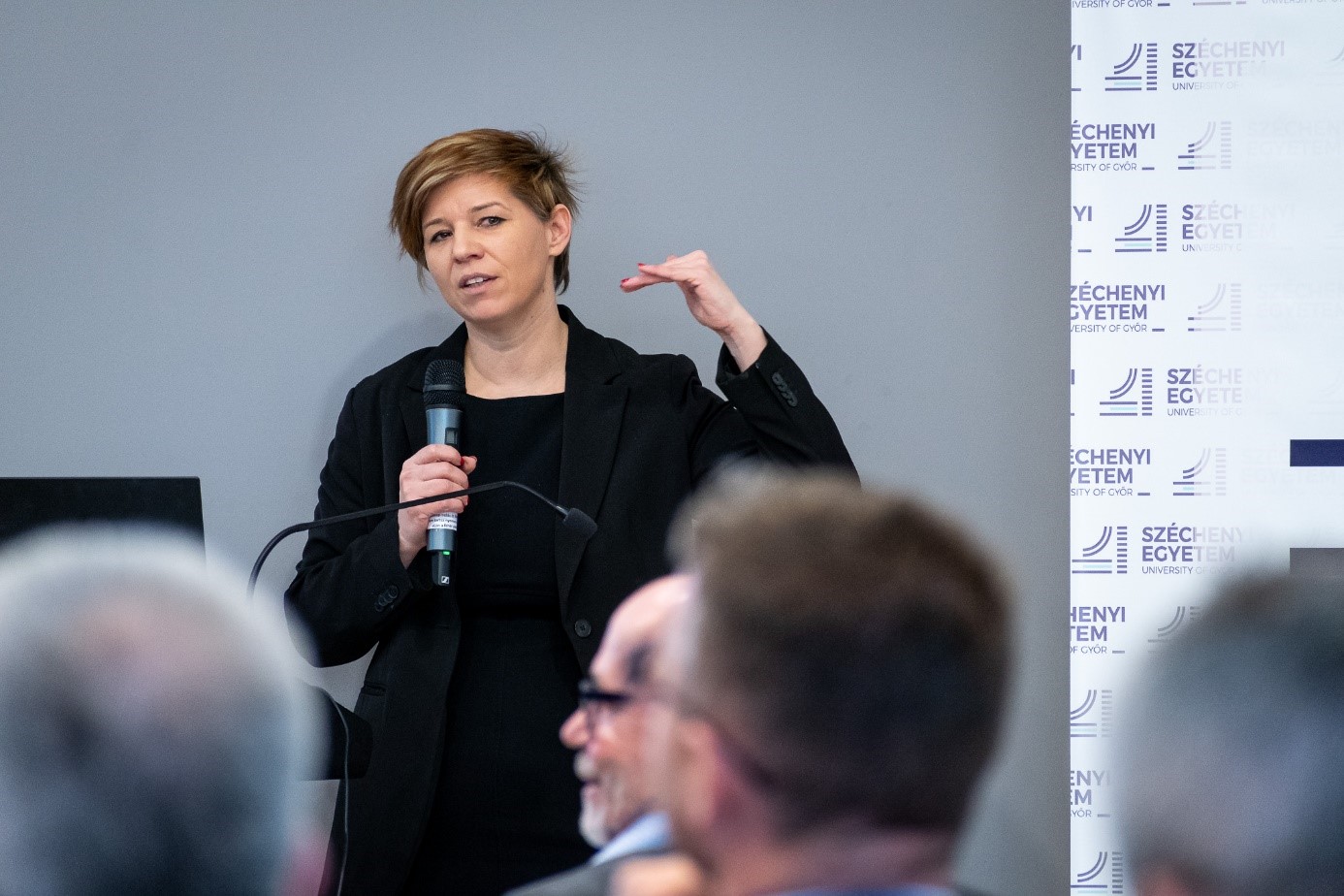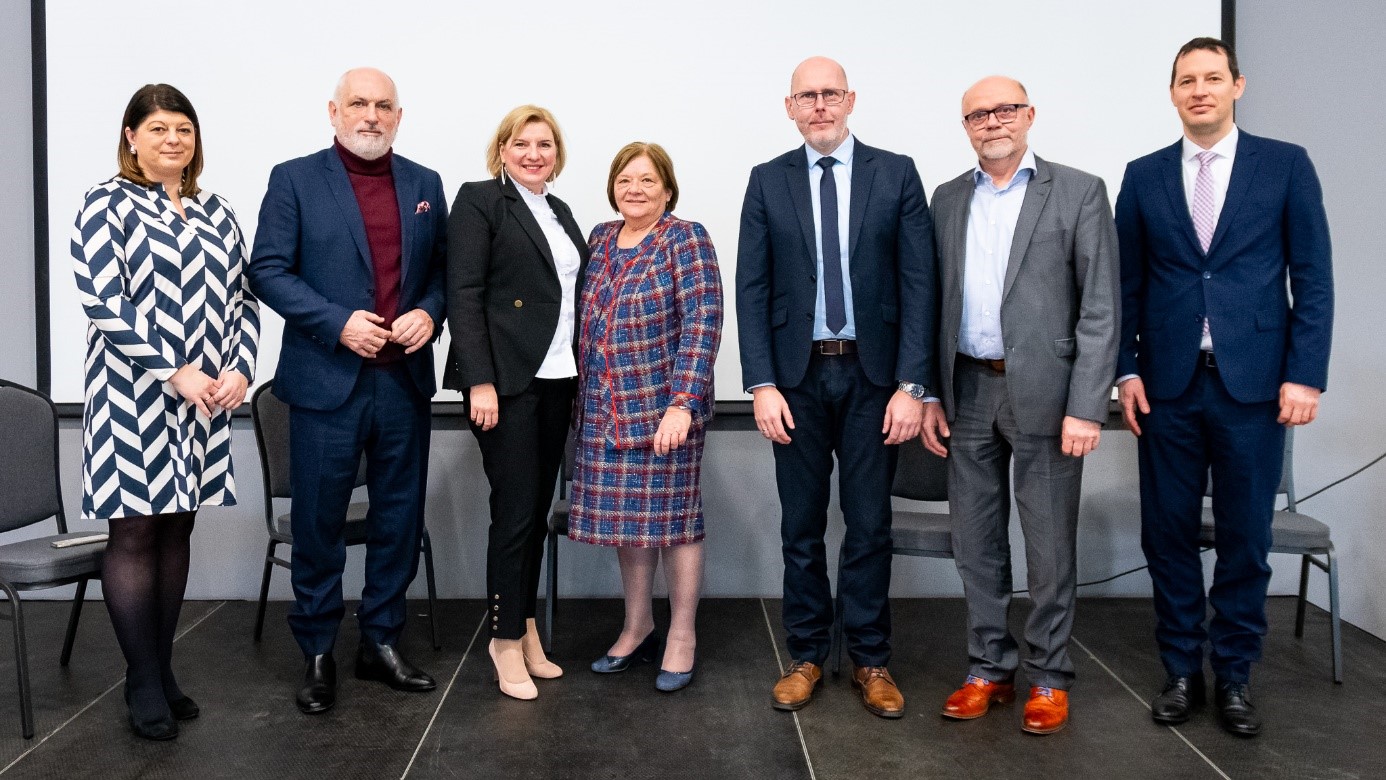SZE organised a conference on training development and labour market expectations
Széchenyi István University organised a conference entitled “Innovation, efficiency, renewal - training development opportunities in higher education” on 15 February. The programme, which focused on the links between higher education and the labour market, also highlighted the training reform of the Győr institution. An important element of this is that the university should provide an actively supportive environment for students, with an even greater emphasis on practical trainings and project-based education for future professionals, in partnership with the industry.
Széchenyi István University adapts its trainings to labour market needs in order to provide a valuable degree to its students and to contribute to the competitiveness of the economic actors of the region. This is why joint thinking with industry partners is important when developing training development plans. A conference on the current challenges facing higher education was organised at the institution to promote this dialogue.
Dr. Eszter Lukács, Vice President for International Affairs and Strategic Relations welcomed the participants and said that the institution wishes to be among the best in education, research and third mission activities as well.
“Our university’s corporate relationships, its cooperation fulfilling in its innovation parks all show that we are already at the forefront in the latter, but we are also making dynamic progress in research as we have tripled our publication capacity in three years”, she enumerated.
She added:
“The institution has been placed in the international rankings based on its achievements and internationalisation efforts.”
She highlighted that the university is undergoing a comprehensive reform aimed at raising the quality of education to the highest level for both Hungarian and foreign students.

Széchenyi István University’s conference on training development was opened by dr. Eszter Lukács, the institution’s Vice President for International Affairs and Strategic Relations. (Photo: Máté Dudás)
In her speech Dr. Veronika Varga-Bajusz, Deputy Secretary of State for Higher Education, outlined the changes that have led to a turnaround in competitiveness in Hungarian higher education in recent years.
"In 2023, there was a 33 per cent increase in the number of students enrolled, with one in two young people going to a university out of the capital city. It is an international turning point that today 43,000 foreign students are studying in Hungary, and every second publication is produced in international cooperation", she emphasized.
She added:
“We would like to significantly increase the number of international students, to more than double the current number.”
She explained that the three main pillars of the renewal of trainings are practical orientation, the coordination of studies and work, and digitalisation. In addition to the importance of project-based education, she emphasised that new technologies, such as artificial intelligence, are now part of young people's lives, and therefore they should not be prohibited but their proper and ethical use should be taught and regulated.

Dr. Veronika Varga-Bajusz, Deputy Secretary of State for Higher Education, spoke about the results achieved so far and the next steps of the renewal of the training system (Photo: Máté Dudás)
"The competitiveness of a country depends to a large extent on the quality of its degrees, their relationship with the labour market, and the usability of the knowledge that students have acquired at a given university", dr. Valéria Csépe, president of the Hungarian Accreditation Committee emphasized. She added that quality assessment and authentication have an important role to play in this. She pointed out that the new structure reflects a change in approach, where the focus is on expected learning outcomes rather than training and output requirements, that is the knowledge and skills that students will have to meet labour market expectations. She concluded by pointing out that the alpha generation will start secondary school this year, meaning that they will enter higher education in 2028. In their case, other skills come to the fore, to which education must also adapt.

Other speakers of the day and participants in the round table discussion: Andrea Orosz, human resources director of Robert Bosch Kft., Imre Pintér-Péntek, President of Győr-Moson-Sopron County Chamber of Commerce and Industry, Kinga Németh, member of the Board of Directors responsible for personnel and organisation at Audi Hungaria Zrt., dr. Valéria Csépe, President of the Hungarian Accreditation Committee, Gábor Dósa, Managing Director of Uni-Inno Kft. owned by Széchenyi university, dr. Barna Hanula, Associate Professor at the university’s Audi Hungaria Faculty of Automotive Engineering and dr. Zsolt Kovács, Vice President for General and Educational Affairs. (Photo: Máté Dudás)
Dr. Zsolt Kovács, Vice President for General and Educational Affairs of Széchenyi University, informed the participants about the curriculum reform of the institution, namely its plans for the development of education. As he said, the preparatory work involved drawing up a map of the problems and identifying the areas for development. He outlined the institution's training strategy, which focuses on supporting the student's journey, quality education and the introduction of new methods. He noted that the new model curriculum framework is based on coherence of content, methodological development and labour market relevance. He underlined that transposing international practices, expanding the laboratory infrastructure, highlighting excellence in teaching, and improving processes and teachers are also key elements of the reform.
"Our aim is to turn the student into a young colleague and their mass should become a team, a community. This requires instructor-led training and participant-led learning. This results in industrial partnerships, patents, intellectual products, research results, quality publications and successful professionals for the labour market", he closed his speech.The day concluded with a round table discussion where experts, market players expressed their views on higher education training and the opportunities for cooperation between the economy and higher education.











